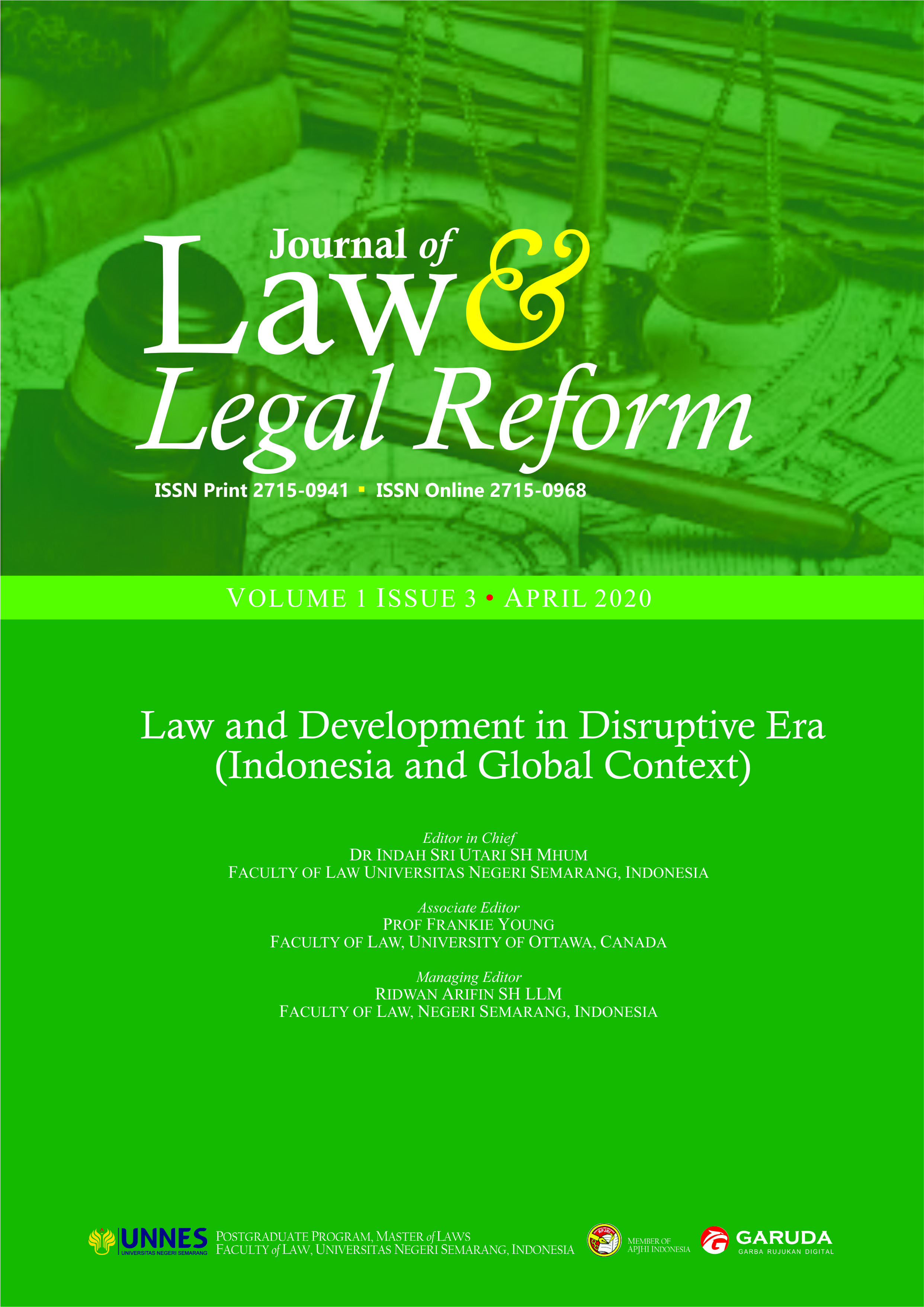Position of the Victim in Criminal Acts Illegal Logging
Main Article Content
Abstract
The purpose of this study is to analyze the position of victims in criminal acts of illegal logging, find juridical reasons to the extent that the state pays more attention to state losses as victims compared to the position of the community as victims in illegal logging. This research method uses a qualitative approach with normative juridical law design. Data collection techniques using library research. Data analysis techniques: (1) presentation, (2) data reduction, and (3) collection and verification. The results of the study: (1) The position of the victim in the case of illegal logging in the criminal justice system is still lacking due to the regulation of the law and the principles in the Criminal Procedure Code itself more prioritizing retribution as embezzlement, ie seeing how much loss arises due to the perpetrators criminal without seeing the position of the community as victims indirectly. Whereas in terms of justification or legal basis in which the government / state is more concerned with the state's loss than the community as a victim. There are principles in the Indonesian criminal procedure law which are strengthened by the Constitutional Court's decision in "MKRI ruling Number 3 / PUU-VIII / 2010" which argues that state control over the earth and water and the natural resources contained therein. This means that the state is given the freedom to regulate, make policies, manage and oversee the use of the earth and water and natural resources contained in it with a constitutional measure that is as much as possible the prosperity of the people and considers the rights of the people as victims only of an objective nature where the state takes policy with more attention to victims generally.
Article Details
All writings published in this journal are personal views of the authors and do not represent the views of this journal and the author's affiliated institutions. Author(s) retain copyrights under a Creative Commons Attribution-NonCommercial-ShareAlike 4.0 International (CC BY-NC-SA 4.0).
References
Ali, A. (2012). Menguak Teori Hukum (legal theory) dan Teori Peradilan (Judicial Prudence). Jakarta: Kencana Prenada Media Group.
Arief, B.N. (2014). Bunga Rampai Kebijakan Hukum Pidana (Perkembangan Penyusunan Konsep KUHP Baru). Jakarta: Pranamedia Group, Jakarta.
Arifin, R. (2020a). Crimes and Society, How Do the Law Respond to Disruptive Conditions?. Law Research Review Quarterly, 6(1), i-iv. Retrieved from https://journal.unnes.ac.id/sju/index.php/snh/article/view/37437
Arifin, R. (2020b). Legal Reform Discourse in Indonesia and Global Context: How Does The Law Respond to Crime. Journal of Law and Legal Reform, 1(2), 193-196. https://doi.org/10.15294/jllr.v1i2.37057
Arifin, R., & Choirinnisa, S.A. (2019) Pertanggungjawaban Korporasi dalam Tindak Pidana Pencucian Uang dalam Prinsip Hukum Pidana Indonesia (Corporate Responsibility on Money Laundering Crimes on Indonesian Criminal Law Principle). JURNAL MERCATORIA 12(1), 43-53. DOI: http://dx.doi.org/10.31289/mercatoria.v12i1.2349
Arwana, Y.C., & Arifin, R. (2019). Jalur Mediasi dalam Penyelesaian Sengketa Pertanahan Sebagai Dorongan Pemenuhan Hak Asasi Manusia. Jambura Law Review 1(2), 212-236. DOI: https://doi.org/10.33756/jalrev.v1i2.2399
Iskandar, I. (2004). Perlindungan hukum Kawasan Hutan di Provinsi Bengkulu Ditinjau Dari Segi Hukum Lingkungan Administrasi. KANUN: Jurnal Ilmu Hukum 38(2), 135-148.
Mahfud, M.D. (2012). Politik Hukum di Indonesia. Jakarta: PT Raja Grafindo Persada.
Masyhar, A. (2008). Pergulatan Kebijakan Hukum Pidana dalam Ranah Tataan Sosial. Semarang: UNNES Press.
Medan, S. (2010). Pengantar Ilmu Hukum. Kupang: Fakultas Hukum, Universitas Nusa Cendana.
Muladi, M., & Arief, B.N. (1998). Teori-Teori dan Kebijakan Pidana. Bandung: PT. Alumni.
Nurjaya, N. (2008). Pengelolaan Sumber Daya Alam dalam Perspektif Antropologi Hukum. Jakarta: Prestasi Pusat Karya.
Ricar, Z. (2012). Disparitas Pembalakan Liar dan Pengaruhnya Terhadap penegakan Hukum di Indonesia. Bandung: PT. Alumni.
Republic of Indonesia. (1945). Constitution of Republic of Indonesia 1945.
Republic of Indonesia. (1981). Law Number 8 of 1981 concerning Indonesian Criminal Procedural Code.
Indonesian Criminal Code, Kitab Undang-Undang Hukum Pidana (KUHP)
Republic of Indonesia (1999). Law Number 41 of 1999 concerning Forestry.
Republic of Indonesia. (2006). Law Number 13 of 2006 concerning Witness and Victim Protection.
Republic of Indonesia. (2009). Law Number 32 of 2009 concerning Environmental Protection and Management.
Republic of Indonesia. (1990). Law Number 5 of 1990 concerning Conservation of Indonesia's Biological Natural Resources.
Sugiyanto, S. (2016). Ekonomi Sumber Daya Alam. Yogyakatta: Sekolah Tinggi Ilmu Manajemen YKPN.
Surahman, S., & Hamzah, A. (2005). Pre-Trial Justice Discretionary Justice (Dalam KUHAP Berbagai Negara). Jakarta: Sinar Grafika.
